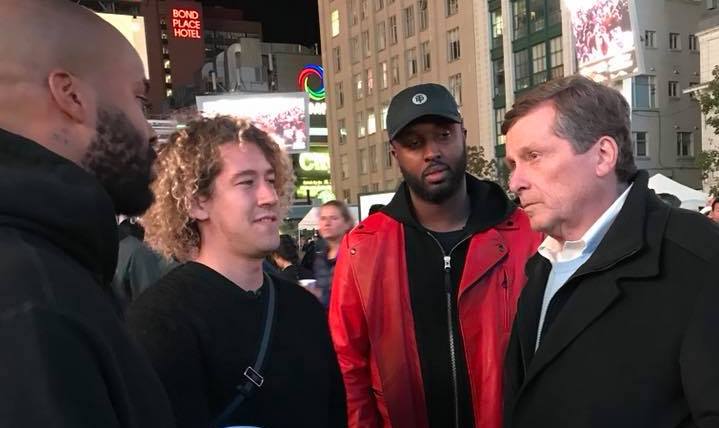The CBC has cancelled its Toronto mayoral debate scheduled for October 16. An editor’s note posted on the national broadcaster’s Toronto website on October 3 stated incumbent John Tory declined the invitation to the one-on-one debate with opponent Jennifer Keesmaat, saying that he would only participate in the debate if it included more candidates.
Marissa Nelson, senior managing director for CBC’s Ontario region, claims the broadcaster uses specific criteria to determine which candidates “could actually win,” and that Tory’s demands for more candidates undermines the CBC’s “editorial independence.”
CBC’s announcement comes on the heels of a recent NOW magazine article by reporter Azeezah Kanji that states: “Reporting on the Toronto mayoral election as a two-horse race not only anticipates the election’s outcome, but fundamentally skews it.”
As the first piece in this series on mayoral candidate Saron Gebresellassi noted, even before Keesmaat announced that she was running, there was more media attention devoted to the possibility of her mayoral run than to the confirmed candidates. This skewed coverage continued after Keesmaat’s announcement, and has framed much of the lead up to the October 22 vote.
“Instead of correcting for the deep social, economic and political disadvantages of racism and sexism, media compound them. When progressive women of colour win elections, it is in spite of the formidable array of forces stacked against them,” Kanji wrote, noting the many mainstream media outlets that have only covered Tory and Keesmaat.
So what is to be made of Tory’s decision to decline the invitation on the basis of representation and the CBC’s related decision to cancel the debate?
For starters, Tory’s decision is strategic. While calling for greater participation in the debate increases the visibility of other candidates, it also decreases the amount of time Tory must spend responding directly to Keesmaat on issues like transit, for which she clearly has the upper hand. It also opens up Keesmaat for critique on the weaker aspects of her platform, such as policing and safety, which proved highly unfavourable at the recent Black Community mayoral debate.
Regarding the CBC, few redeeming things can be said about a debate purporting to showcase only viable candidates when the coverage leading up to this debate has been nothing short of exclusionary. When candidates are only taken seriously based on their visibility, yet the media refuses to cover them, we end up in a situation where media bias is shaping the public interest.
Nelson acknowledges in her editorial note that “debates influence campaign results” but has not extended this analysis to all aspects of the CBC’s election coverage. Debates influence campaign results, as do polls, profiles, op-eds and reporting. Each plays a significant role in shaping the public discourse, for better or for worse. The fact that the CBC’s process for determining debate participants led it to propose such a grossly unrepresentative debate at such a critical juncture in Toronto politics is deeply concerning.
Democratic Deficit
The media has latched on to the fact that Tory and Keesmaat are well-connected, high-profile professionals with strong ties to wealthy Torontonians and institutions. These attributes, in addition to whiteness, are often treated as prerequisites for being taken seriously as a mayoral candidate. These attributes often also mean that the candidates most amplified in the media lack a strong analysis of oppression and possess weak ties, if any, to Toronto’s low-income and racialized communities.
Ultimately, the result of framing this election as a two-horse race is the narrowing of possibility in Toronto. This was apparent in the Black Community Mayoral Debate held earlier this week.
In that debate, Tory and Keesmaat received lukewarm support from an audience that was, instead, captivated by the possibilities and alternatives presented by candidates Saron Gebresellassi and Knia Singh. The debate was instructive for audience members as it illustrated the wide range of positions held by the candidates on issues like employment, culture, safer streets, public health and gentrification.
While Tory and Keesmaat affirmed the importance of community policing, Gebresellassi and Singh drew on the extensive organizing experience and noted the many pitfalls of policing in the city. Gebresellassi, for example, called from a portion of the police budget to be reallocated to Neighbourhood Improvement Areas in the city, while Singh noted, “we cannot police ourselves out of a situation that is based on poverty.”
In a statement released October 4, Singh’s campaign commended Tory for his stance, saying “Political pundits are saying Tory is refusing to debate Keesmaat one-on-one, but they are dismissing the fact he has asked for other candidates who have a contributed to the city’s affairs should be included in the debates.”
The statement added, “Some journalists claim no one else has a chance besides Tory and Keesmaat, but that is because those journalists and news directors are preventing exposure to other candidates and, thereby, making that decision for the public.”
Phillip Dwight Morgan is a Toronto-based journalist and writer. He is the inaugural rabble.ca Jack Layton Journalism Fellow.
This is article is part of rabble’s series on the 2018 Toronto election. Follow the series here.
Photo: John Tory/Facebook




